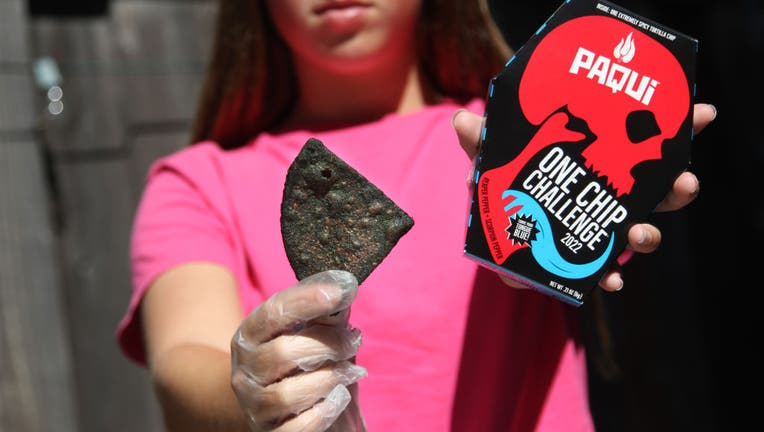Georgia police warning parents about viral 'One Chip Challenge' after student injured

A recent social media trend has caused some children to vomit, sweat profusely and their tongues turn blue after participating in the One Chip Challenge. (Photo by Sarah Dussault/MediaNews Group/The Mercury News via Getty Images)
DUNWOODY, Ga. - Police in Georgia are warning parents about a social media food challenge that has left at least one student needing medical treatment.
The Dunwoody Police Department issued a warning about the One Chip Challenge after a Dunwoody High School student became injured after accepting the challenge.
The viral challenge, which originally started in 2016 as a marketing campaign by the tortilla chip company Paqui, has led to bans in schools across the country. In the challenge, participants eat a single chip, which is flavored with extremely hot peppers. This year's version include flavors of the scorpion pepper and makes the eater's tongue turn blue.
The National Capital Poison Center Poison Control has a web page dedicated to the challenge, that explains the capsaicin in the chip can cause anything from mild mouth and throat pain to intestinal and throat irritation. In extreme cases, the chip can cause more serious problems like chest pain, heart palpitations, and even heart attacks. The irritation can last for hours or even days.
The Dunwoody Police Department is asking parents to "please take time to research this seemingly innocent challenge and subsequent results, then have a sit-down with your children to discuss the challenge and reasons why they should not take part in it."
Officials say, the best way to get relief after the One Chip Challenge is by drinking milk. The agency also suggest people wash their hands thoroughly with soap and water to avoid spreading the capsaicin to other parts of the body.
If you get capsaicin gets in your eyes, Poison Control suggests washing them out with room temperature water for 15-20 minutes.
Anyone with severe reactions should seek help from Poison Control online or by calling 1-800-222-1222.

